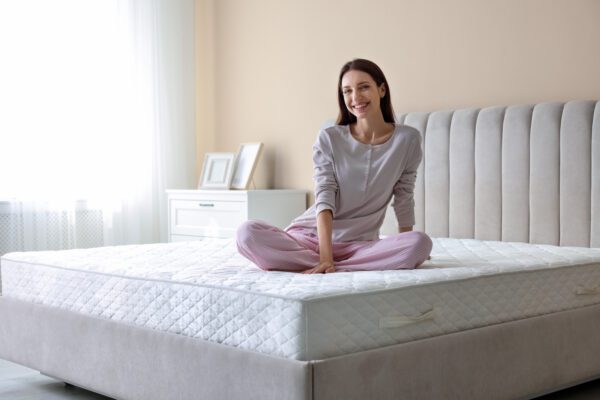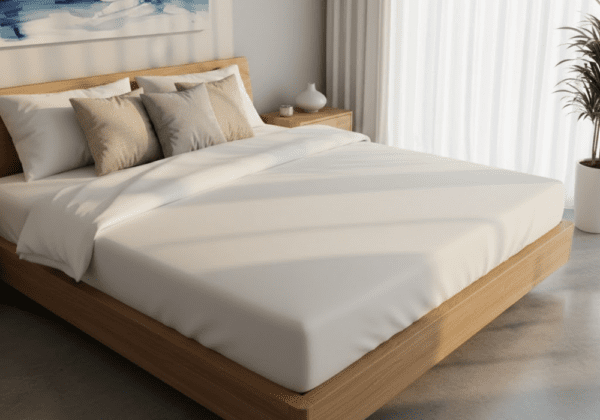A restful night’s sleep is more than just a luxury—it’s a necessity. From boosting your mood to improving your physical health, sleep is a fundamental pillar of overall well-being. But did you know that your mattress plays a pivotal role in determining the quality of your sleep? Beyond preferences for a soft, medium, or firm feel, the right mattress has far-reaching impacts on your health.
This blog explores how a good mattress is integral to restful sleep, the science of sleep, and why investing in a quality mattress could mean investing in yourself. By the end, you’ll know how to choose the best mattress for your needs and why prioritizing sleep quality is one of the most profound decisions you can make for your health.
 The Science of Sleep
The Science of Sleep
Sleep isn’t just downtime for your body—it’s an active process essential for various restorative functions. To understand why your mattress affects your health, we first need to explore the stages of sleep and their effects on the body.
Stages of Sleep and Their Impact
Sleep occurs in cycles, transitioning through four stages:
- Stage 1 (Light Sleep)
– This transition phase lasts only a few minutes as your heart rate slows and muscles relax.
- Stage 2 (Deep Relaxation)
– During this stage, your body temperature drops, and your brain waves slow, helping you relax deeper.
- Stage 3 (Deep Sleep)
– Known as restorative sleep, this is when your body repairs cells, boosts immunity, and strengthens tissues.
- REM Sleep (Rapid Eye Movement)
– Critical for cognitive function, REM sleep fosters dreaming, processes memories, and regulates emotions.
Without proper progression through these stages, you may experience grogginess, reduced focus, and weakened physical health. And, surprisingly, one of the key disruptors of this cycle can be your mattress.
The Role of a Mattress
Better Sleep through Proper Support
The primary role of a mattress is to provide support while aligning your spine and relieving pressure points. A mattress that inadequately supports your body can result in discomfort, back pain, or persistent tossing and turning. This form of sleep disruption may prevent the body from achieving the restorative deep and REM stages of sleep.
Mattress Quality and Sleep Disorders
Issues such as back pain, neck stiffness, and even sleep apnea can be exacerbated by a low-quality mattress. Misaligned spinal posture or excessive pressure leads to strain on your bones and muscles, promoting discomfort that interrupts the sleep cycle. Memory foam mattresses, for instance, are often recommended for their ability to contour to an individual’s body and alleviate these points of tension.
Health Benefits of Quality Sleep
Good sleep isn’t just about feeling rested—it’s a cornerstone of overall health. Here are just a few ways proper sleep positively affects your well-being.
Physical Health
Consistent quality sleep improves immune function, accelerates muscle repair, and promotes heart health. On the flip side, poor sleep has been linked to high blood pressure, increased risk of stroke, and slower recovery from injuries.
Mental Health
Poor sleep dramatically affects mental health, leading to anxiety, stress, and even depression. On the other hand, a good night’s sleep helps stabilize emotions and improves focus, creativity, and productivity.
Sleep’s Role in Metabolism and Weight Management
Studies show individuals lacking quality sleep experience hormonal imbalances, particularly in leptin and ghrelin, which regulate hunger. This imbalance is often linked to increased appetite and the potential for weight gain, underscoring the connection between proper sleep and a healthy metabolism.
 Signs You Need a New Mattress
Signs You Need a New Mattress
Wondering if your mattress is due for an upgrade? Here are common signs it may be affecting your sleep quality:
- Persistent back, hip, or neck pain upon waking.
- Sagging or visible wear and tear on the mattress.
- Feeling overly hot or uncomfortable during sleep.
- Increased instances of waking up during the night.
- The age of your mattress exceeds 7–10 years (depending on material).
If you notice one or more of these signs, it might be time to consider investing in a new mattress that better supports your health.
Choosing the Right Mattress
Selecting the right mattress depends on several personal factors. Here’s what to consider when shopping for the perfect match for your sleep needs.
1. Sleep Position
- Back Sleepers need medium-firm mattresses to support spinal alignment without excessive sinking.
- Side Sleepers often benefit from softer mattresses that ease pressure on hips and shoulders.
- Stomach Sleepers do best with firmer mattresses to prevent the midsection from sinking too deeply.
2. Health Conditions
People with chronic pain conditions, such as arthritis, may benefit from memory foam or hybrid mattresses that contour to the body’s curves. Those with allergies should look for hypoallergenic materials, such as natural latex or specialized covers to resist dust mites.
3. Material Preferences
- Memory Foam offers tailored support but can retain heat.
- Hybrid Mattresses combine foam and coils for balanced support and cooling.
- Latex is durable, eco-friendly, and naturally cooling.
- Spring Mattresses may lack contouring but provide improved airflow.
4. Budget and Durability
While premium mattresses may seem like a significant expense upfront, they tend to last longer and deliver better long-term value. Remember, the cost of quality sleep is far outweighed by its health benefits.
The Future of Mattresses and Sleep Technology
The mattress industry is evolving rapidly with advancements in sleep technology designed to optimize comfort and health. Some of the most exciting trends include:
- Smart Mattresses: Devices equipped with sensors to monitor sleep patterns, detect movement, and adjust support levels in real-time.
- Cooling Technology: Innovation focused on regulating body temperature for uninterrupted rest.
- Customizable Mattresses: Solutions enabling adjustable firmness settings to accommodate varied needs for couples or individuals.
These advancements aim to make quality sleep more accessible, allowing individuals to achieve healthier and more restful nights.
Sleep isn’t just a time to recharge—it’s a critical component of your overall mental, physical, and emotional well-being. By investing in the right mattress, you can elevate the quality of your sleep, prevent health issues, and feel more energized each day.
Take the first step toward better sleep by reassessing your mattress. Whether it’s time for an upgrade or understanding the science behind proper sleep, making informed decisions today will leave you better rested tomorrow.


 Signs You Need a New Mattress
Signs You Need a New Mattress


